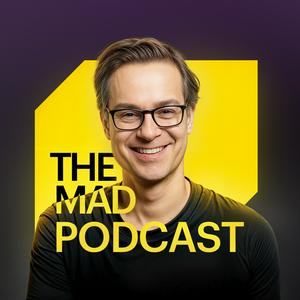Voice used to be AI’s forgotten modality — awkward, slow, and fragile. Now it’s everywhere. In this reference episode on all things Voice AI, Matt Turck sits down with Neil Zeghidour, a top AI researcher and CEO of Gradium AI (ex-DeepMind/Google, Meta, Kyutai), to cover voice agents, speech-to-speech models, full-duplex conversation, on-device voice, and voice cloning.
We unpack what actually changed under the hood — why voice is finally starting to feel natural, and why it may become the default interface for a new generation of AI assistants and devices.
Neil breaks down today’s dominant “cascaded” voice stack — speech recognition into a text model, then text-to-speech back out — and why it’s popular: it’s modular and easy to customize. But he argues it has two key downsides: chaining models adds latency, and forcing everything through text strips out paralinguistic signals like tone, stress, and emotion. The next wave, he suggests, is combining cascade-like flexibility with the more natural feel of speech-to-speech and full-duplex conversation.
We go deep on full-duplex interaction (ending awkward turn-taking), the hardest unsolved problems (noisy real-world environments and multi-speaker chaos), and the realities of deploying voice at scale — including why models must be compact and when on-device voice is the right approach.
Finally, we tackle voice cloning: where it’s genuinely useful, what it means for deepfakes and privacy, and why watermarking isn’t a silver bullet.
If you care about voice agents, real-time AI, and the next generation of human-computer interaction, this is the episode to bookmark.
Neil Zeghidour
LinkedIn - https://www.linkedin.com/in/neil-zeghidour-a838aaa7/
X/Twitter - https://x.com/neilzegh
Gradium
Website - https://gradium.ai
X/Twitter - https://x.com/GradiumAI
Matt Turck (Managing Director)
Blog - https://mattturck.com
LinkedIn - https://www.linkedin.com/in/turck/
X/Twitter - https://twitter.com/mattturck
FirstMark
Website - https://firstmark.com
X/Twitter - https://twitter.com/FirstMarkCap
(00:00) Intro
(01:21) Voice AI’s big moment — and why we’re still early
(03:34) Why voice lagged behind text/image/video
(06:06) The convergence era: transformers for every modality
(07:40) Beyond Her: always-on assistants, wake words, voice-first devices
(11:01) Voice vs text: where voice fits (even for coding)
(12:56) Neil’s origin story: from finance to machine learning
(18:35) Neural codecs (SoundStream): compression as the unlock
(22:30) Kyutai: open research, small elite teams, moving fast
(31:32) Why big labs haven’t “won” voice AI4
(34:01) On-device voice: where it works, why compact models matter
(46:37) The last mile: real-world robustness, pronunciation, uptime
(41:35) Benchmarking voice: why metrics fail, how they actually test
(47:03) Cascades vs speech-to-speech: trade-offs + what’s next
(54:05) Hardest frontier: noisy rooms, factories, multi-speaker chaos
(1:00:50) New languages + dialects: what transfers, what doesn’t
(1:02:54 Hardware & compute: why voice isn’t a 10,000-GPU game
(1:07:27) What data do you need to train voice models?
(1:09:02) Deepfakes + privacy: why watermarking isn’t a solution
(1:12:30) Voice + vision: multimodality, screen awareness, video+audio
(1:14:43) Voice cloning vs voice design: where the market goes
(1:16:32) Paris/Europe AI: talent density, underdog energy, what’s next


